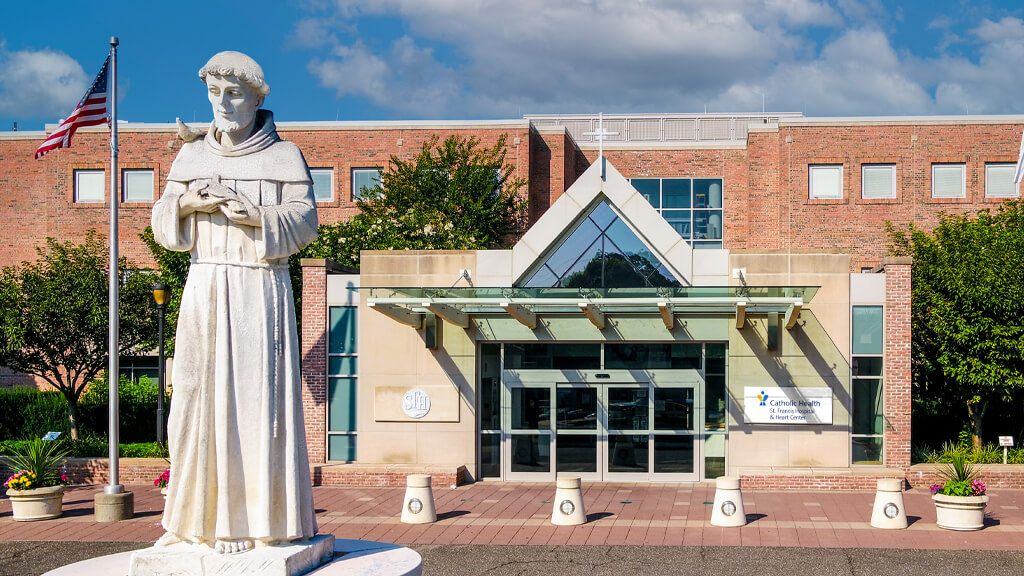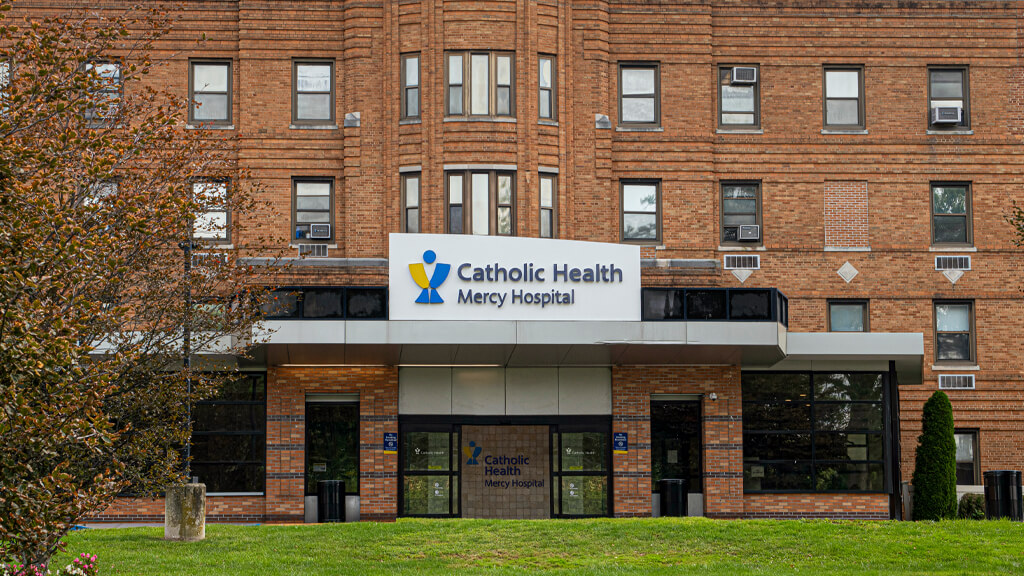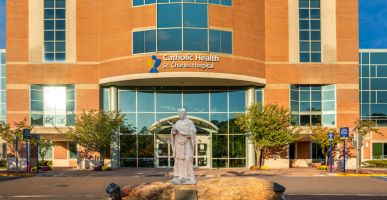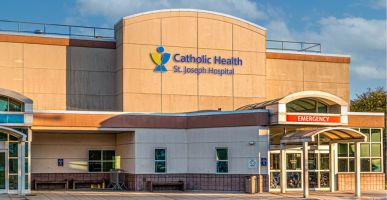Excellence in Lung & Respiratory Care
Catholic Health's dedicated team of pulmonary experts gives Long Islanders access to nationally recognized care for lung and respiratory conditions. Our team includes pulmonologists, respiratory therapists, rehabilitation doctors and nurses who work closely with patients to create personalized and comprehensive treatments.
Our compassionate care focuses on helping patients, especially those with chronic respiratory ailments, live as fully and independently as possible.
We are also experts in pediatric pulmonology. Our Catholic Health Cancer Institutes across Long Island offer a robust lung cancer program, including lung cancer screenings to detect early-stage lung cancer.
Our Lung & Respiratory Program
- Asthma
- Bronchiectasis
- Cardiopulmonary
- Chronic lung disease
- COVID-19 post respiratory care
- Shortness of breath
- Chronic lung disease
- Chronic obstructive pulmonary disease (COPD)
- Cystic fibrosis
- Emphysema
- Lung Diseases
- Neuromuscular pulmonary disease
- Pneumonia
- Pulmonary embolism
- Pulmonary fibrosis
- Pulmonary hypertension
- Restrictive lung disease
- Sarcoidosis—inflammatory disease that affects multiple organs
- Scoliosis affecting lungs
- Cardiopulmonary rehabilitation
- Chest X-ray
- Complete pulmonary function studies
- Diagnostic laboratory studies
- Electrocardiogram
- Exercise tolerance test to establish safe exercise levels and baseline activities
- Fiber optic bronchoscopy
- Pleural biopsy/chest tap
- Preoperative evaluation
- Pulmonary function testing
- Pediatric rehabilitation
- Pulmonary rehabilitation
- Sleep studies
- Supervised cardiac-monitored exercises
Cardiopulmonary stress testing is a specialized examination to quantify exercise work capacity and design exercise prescriptions for pulmonary rehabilitation.
Services provided to patients with disorders of the cardiopulmonary system include:
- Diagnostic testing
- Education (for patients and families)
- Monitoring
- Rehabilitation
- Therapeutics
St. Charles Hospital's cardiopulmonary rehabilitation is a hospital-based program for critical patients who need rehabilitation before returning home. You can also find care at. St. Francis Hospital & Heart Center, home to Long Island's most awarded heart program.
Good Samaritan Hospital (West Islip, NY) and Mercy Hospital (Rockville Centre, NY) each have a pulmonary function laboratory that uses the most advanced technology to diagnose lung diseases, including asthma, emphysema and other pulmonary problems.
Good Samaritan Hospital also offers pediatric testing at Good Samaritan Pediatrics (Babylon, NY).

Award-Winning Care
St. Francis Hospital & Heart Center is nationally recognized by U.S. News & World Report for Pulmonology & Lung Surgery.
Pulmonary Embolisms
A pulmonary embolism occurs when a blood clot is lodged in an artery in the lung and blocks blood flow. Blood clots typically form elsewhere in the body but most commonly in the legs. The clot then travels through the right side of the heart and makes its way into the lungs.
Good Samaritan Hospital’s PERT (Pulmonary Embolism Response Team) is a unique multidisciplinary approach for high-and intermediate-risk patients experiencing a pulmonary embolism. The team includes intensivists, interventional cardiologists and cardiothoracic surgeons.
The PERT Team is activated once a patient meets the criteria and a pulmonary embolism is diagnosed for a patient at risk. They employ an EKOS catheter, the only FDA-approved device for Ultrasound Assisted Thrombolysis.
Symptoms related to pulmonary embolisms:
- Blue nails or lips
- Chest pain
- Cough (especially if you are coughing up blood)
- Consistent perspiration
- Lightheaded or fainting
- Pain in your back
- Shortness of breath
A variety of tests are available to confirm a pulmonary embolism. A chest X-ray or an ultrasound are necessary to determine if there is a blood clot in the leg. Various pulmonary tests are also performed to check the function of your lungs.
Individuals who are high-risk:
- Are immobile
- Have an inherited condition or may inherit a condition such as blood clotting disorders
- Have been inactive for an extended period of time
- Have had surgery or broken a bone since the risk for blood clots is higher after a surgery or broken bone
Benefits of thrombolysis treatment include:
- Improved blood flow
- Less blood loss when compared to a traditional surgery
- No obvious surgical incision
- Reduced and improved related symptoms without a more invasive surgery
- Safe and highly effective in promoting circulation blocked by a clot
Pulmonary Rehabilitation
Catholic Health offers comprehensive outpatient pulmonary rehabilitation programs for adults and children at locations across Long Island. Our physiatrists (physical medicine and rehabilitation physicians) and rehabilitation nurses help patients manage or improve their lung and respiratory conditions. Pulmonary rehabilitation also benefits patients who are preparing for, or recovering after, lung surgery.
Our programs provide convenient access to exercise, education and wellness support. Patients notice improved functional status and they gain a better understanding of their disease.

Our Pulmonary Rehabilitation Programs
Catholic Health offers pulmonary rehabilitation at:
- Good Samaritan Hospital (West Islip, NY): 631-376-3000
- Mercy Hospital (Rockville Centre, NY): 516-626-3729
- St. Charles Hospital (Port Jefferson, NY): 631-474-6111
- For cardiopulmonary rehabilitation: 631-474-6797
- St. Francis Hospital & Heart Center (Roslyn, NY): 516-629-2102
Requirements to join a pulmonary rehabilitation program may include:
- A physician prescription to determine eligibility for the program based on an assessment of prerequisite test results.
- An initial evaluation and screening to complete a customized exercise program, including the number of sessions per week and per month.
- An exercise test performed upon qualification.
Upon completion of a program, patients are reevaluated by a pulmonary physician. A complete summary of all tests, prescriptions and progress is sent to a patient’s physician.
- Comprehensive services provided by pulmonologists, registered physical therapists, registered dieticians and medical social workers.
- Respiratory specialists work with patients and their doctors to develop an individualized plan to improve physical fitness and exercise tolerance to reduce hospitalization and to lessen the impact of lung disease. Monitored exercise sessions are easily incorporated into a personalized program.
- Education and medically supervised exercise sessions are offered in a supportive environment designed specifically for those with lung problems.
- Pulmonary function tests and diagnostic imaging services help establish safe exercise levels and baseline activities.
- Supervised cardiac-monitored exercises. Therapists monitor vital signs, such as blood pressure and heart rate, during exercise.
- Oxygen is monitored and available as ordered by the physician for patients who need it to exercise safely and with less shortness of breath.
- Maintenance and wellness optional programs are available after completion of a pulmonary rehabilitation program.
- Patients and their referring physicians receive suggestions for self-maintenance and an individualized exercise prescription.
- Family involvement is strongly welcomed and encouraged.
Exercise training is the basic component of pulmonary rehabilitation. We also incorporate behavioral health support, breathing exercises and respiratory muscle training.
Pursed-Lip Breathing Exercise. Inhaling through the nose and exhaling out through pursed lips makes breathing easier and helps to regain control when unable to catch a breath.
Muscle Training. Includes bench pressing, leg extension and lateral pull-downs to help build and restore the body around the lungs. More muscle to power the body means more strength to walk.
Stress Management. Awareness of anxiety levels to reduce anxiety when short of breath. Common with chronic obstructive pulmonary disease (COPD).
Exercise Machines
- Treadmill to increase endurance, cardiovascular function and muscle strength, especially those used the most during walking.
- Stationary bike to improve overall fitness.
- Arm ergometry, described as a bicycle for the arms, strengthens upper body muscles (forearms, chest and back).
Lung Cancer Screenings
Quick, painless and non-invasive screenings help detect early-stage lung cancer.
Pulmonology Locations

St. Francis Hospital & Heart Center
Roslyn, NY

Good Samaritan University Hospital
West Islip, NY

Mercy Hospital
Rockville Centre, NY

St. Charles Hospital
Port Jefferson, NY

St. Catherine of Siena Hospital
Smithtown, NY

St. Joseph Hospital
Bethpage, NY

